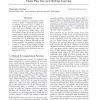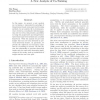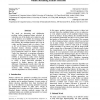121
Voted
ICML
2010
IEEE
15 years 3 months ago
2010
IEEE
A system for musical accompaniment is presented in which a computer-driven orchestra follows and learns from a soloist in a concerto-like setting. The system is decomposed into th...
114
Voted
ICML
2010
IEEE
15 years 3 months ago
2010
IEEE
We develop a novel online learning algorithm for the group lasso in order to efficiently find the important explanatory factors in a grouped manner. Different from traditional bat...
90
Voted
ICML
2010
IEEE
15 years 3 months ago
2010
IEEE
In this paper, we present a new analysis on co-training, a representative paradigm of disagreement-based semi-supervised learning methods. In our analysis the co-training process ...
119
Voted
ICML
2010
IEEE
15 years 3 months ago
2010
IEEE
Dimension reduction is popular for learning predictive models in high-dimensional spaces. It can highlight the relevant part of the feature space and avoid the curse of dimensiona...
112
Voted
ICML
2010
IEEE
15 years 3 months ago
2010
IEEE
We present a probabilistic model for clustering of objects represented via pairwise dissimilarities. We propose that even if an underlying vectorial representation exists, it is b...
119
Voted
ICML
2010
IEEE
15 years 3 months ago
2010
IEEE
We study an interesting and challenging problem, online streaming feature selection, in which the size of the feature set is unknown, and not all features are available for learni...
129
Voted
ICML
2010
IEEE
15 years 3 months ago
2010
IEEE
We develop a semi-supervised learning method that constrains the posterior distribution of latent variables under a generative model to satisfy a rich set of feature expectation c...
108
Voted
ICML
2010
IEEE
15 years 3 months ago
2010
IEEE
96
Voted
ICML
2010
IEEE
15 years 3 months ago
2010
IEEE
The problem of clustering is considered, for the case when each data point is a sample generated by a stationary ergodic process. We propose a very natural asymptotic notion of co...
104
Voted
ICML
2010
IEEE
15 years 3 months ago
2010
IEEE
We introduce new, efficient algorithms for value iteration with multiple reward functions and continuous state. We also give an algorithm for finding the set of all nondominated a...



